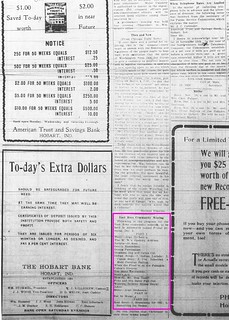
(Click on image to enlarge)
From the Hobart Gazette of 3 Dec. 1920.
A local orchestra … "W.W." might have been "Willing Workers," a Deep River church organization.
Next came recitations and songs. I wonder whether these were performed by children or adults? — perhaps both. Something like "Fritz and His Betsy Fall Out" doesn't seem suitable for a child to recite, but I certainly can imagine a man doing it. Interesting that a piece making fun of a German accent should have played well in a community with many German immigrants.
We all know the story of the Gingham Dog and the Calico Cat, don't we?
The "Indian Songs" were taken from an "American Indian Operetta for Ladies" entitled The Feast of the Red Corn. (I have not been able to find out much about its composer, Paul Bliss, but if he was the son of the hymn-writer, Philip Paul Bliss, he apparently was not of Native American ancestry.)
"When the Frost is on the Pumpkin" and "Mister Hop-Toad" were poems by James Whitcomb Riley. He being the Indiana poet and all, I wonder if these folks thought the dialect in his poems was how they talked?
I can't find the text for "Cohen's Divorce," but based on this description, I'm afraid it was like Fritz and Betsy, only more so.


No comments:
Post a Comment